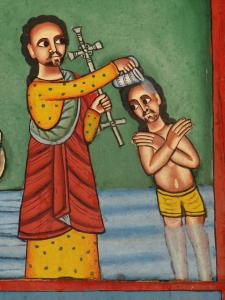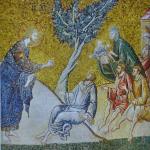
Christ is baptized in the Jordan, and all creation rejoices! Christ is baptized in the Jordan, with the angels looking in with awe! The one who baptizes all things with grace is baptized by John. What great humility! What great love! Christ is baptized in the Jordan, and nothing remains the same:
Then Jesus came from Galilee to the Jordan to John, to be baptized by him. John would have prevented him, saying, “I need to be baptized by you, and do you come to me?” But Jesus answered him, “Let it be so now; for thus it is fitting for us to fulfil all righteousness.” Then he consented. And when Jesus was baptized, he went up immediately from the water, and behold, the heavens were opened and he saw the Spirit of God descending like a dove, and alighting on him; and lo, a voice from heaven, saying, “This is my beloved Son, with whom I am well pleased.” (Matt. 3:13-17 RSV).
Christ ws baptized in the Jordan, and with it, the grace of salvation truly has appeared to all humanity, indeed, to all the world. Christ was not baptized for his own sake, for John was right, he certainly didn’t need to be baptized. Rather, we needed Christ’s baptism. Out of his great love for all creation, Christ came to the waters of the Jordan and had John baptize him. In this manner, he could and would continue to act for the sake of the world, fulfilling the expectations of the law, for it is in that fulfillment he handed out his grace:
It was for this reason that Christ, who fulfills completely the law of justice, is baptized on their behalf as being a just judge, in order that they too, having been baptized in him and receive the rebirth from on high, might enter the heavenly kingdom and, thanks to this immense gift of baptism, might in no way be excluded from it. [1]
We share in his baptism through our baptism. We are incorporated into him, becoming a part of him, so that when he fulfills the expectations of the law, we find ourselves fulfilling the law in and with him. Jesus did not act in vain; he did not come to John just to put on a show. Rather he came to John so that he could continue to live out his life in the way he always intended to do so, to make his whole life one continuous act of love. He transcended all forms of legalism, for the legalists did not and would not understand the superior acts of love which he did; they only thought that all they needed to do was what they were told to do. Jesus confirmed the value of the law by affirming its intention, allowing it to come to its proper potential, one which transcended any legalistic definition that could be and would be made concerning it. In him, the law is fulfilled; as he is eternal, so the law shall never go away. Placing ourselves in him, we are meant to accept the law, to affirm it and its value, to engage its true inner nature, its innate goodness, so that it can flourish and be made greater with grace. That is, as grace perfects nature, and does not destroy it, so the grace which fulfills the law does not deny it but glorifies it. Thus, we read in Titus:
For the grace of God has appeared for the salvation of all men, training us to renounce irreligion and worldly passions, and to live sober, upright, and godly lives in this world, awaiting our blessed hope, the appearing of the glory of our great God and Savior Jesus Christ, who gave himself for us to redeem us from all iniquity and to purify for himself a people of his own who are zealous for good deeds (Tit. 2:11-14 RSV).
Christ’s baptism brings purifying grace to the world, cleansing it from the stain of sin. All things are made new, so that all things can be brought together, made one, and taken up by Christ. Just as the Spirit hovered over the waters in creation, so the Spirit is found coming to us in the waters of baptism at our new creation; just as the Logos established the logoi of creation at the beginning, so in the waters of Jordan, we see the logoi of creation being restored and raised up, made not only new, but better as they are taken up and find their proper place in the Logos from which they came. The baptism of Christ repeats, as it were, the act of creation, allowing it to be the focal point of the new creation, not only of us, but the whole world, as Jean Danielou contemplated:
The Incarnation is the creation of the new universe; and it is this creation which is continued in present history and takes place in Baptism. It is truly a new creation, “regeneration” according to the word used in the Gospel of St. John (III,5). And St. Paul calls the newly baptized a “new creature” (II Cor. 5, 17), and this re-creation is accomplished in the baptism waters (John III, 5). The analogy of the primordial waters with the waters of Baptism is, then, an aspect, which is fundamentally biblical, of the parallelism between the first and the second creation.[2]
And so the God-man begun his ministry with baptism; after spreading purifying grace upon the waters, and with it, to the world, the God-man revealed the truth of the Trinity. Christ inaugurated his preaching ministry, not, of course, by preaching to the world, but through an act of humility and of love. Christ is baptized into the Jordan, let us rejoice and be glad, for all things truly are made new. “For the Word was not baptized stripped of a body, but received baptism having truly become flesh; the Word was baptized for the sake of us men, in order that, having purified our nature and the waters. He might make our salvation perfect.”[3]
[1] St Sophronios of Jerusalem, “Homily 3: Homily on the Holy Baptism” in Homilies. Trans. John M. Duffy (Cambridge: Harvard University Press, 2020), 91 [Talking about those who came before Christ, the prophets who preached about him, how they were baptized in Christ].
[2] Jean Daniélou, SJ, The Bible and the Liturgy (Notre Dame, Indiana: University of Notre Dame Press, 1966), 72.
[3] St Sophronios of Jerusalem, “Homily 3: Homily on the Holy Baptism” in Homilies. Trans. John M. Duffy (Cambridge: Harvard University Press, 2020), 89.
Stay in touch! Like A Little Bit of Nothing on Facebook.
If you liked what you read, please consider sharing it with your friends and family!













